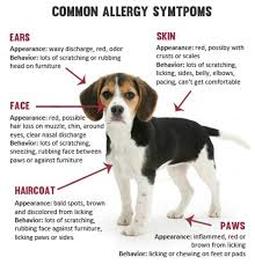Beagles, with their adorable floppy ears and soulful eyes, are beloved companions for many. However, for individuals who suffer from allergies, the question of whether beagles can cause allergic reactions is a valid concern. While some people may assume that any dog can trigger allergies, there are specific factors to consider when it comes to beagles and their potential to cause allergies.
While no dog breed is completely hypoallergenic, beagles are known to produce fewer allergens than some other breeds. Their short coat and minimal shedding can help reduce allergic reactions. However, it’s important to note that individual sensitivities may vary. If you have allergies, spending time with a beagle before bringing one home can help you determine if you’ll have a reaction. Regular grooming and keeping the living environment clean can also help minimize allergic symptoms.

The Link Between Beagles and Allergies
Beagles are popular pets known for their friendly temperament and adorable looks. However, many individuals wonder if these lovable dogs can cause allergies. In this article, we will explore the connection between beagles and allergies, and provide you with the information you need to make an informed decision about bringing a beagle into your home.
Understanding Pet Allergies
Allergies are a common health concern among individuals who have a sensitivity to certain substances. When exposed to an allergen, the immune system reacts by releasing chemicals that cause allergy symptoms. Pet allergies are specifically triggered by proteins found in an animal’s skin cells, urine, or saliva. These proteins, called allergens, can be carried through the air and cause respiratory or skin reactions in susceptible individuals.
It is important to note that allergies can vary from person to person. While some people may be highly allergic to dogs, others may only have a mild reaction or not be affected at all. The severity of the allergy symptoms depends on individual sensitivity and the amount of exposure to the allergen.
The Myth of Hypoallergenic Breeds
Many people assume that hypoallergenic dog breeds, which are breeds that are said to produce fewer allergens, are the only option for individuals with allergies. However, it is important to understand that no dog breed is completely hypoallergenic. Even breeds that are considered hypoallergenic can still produce allergenic proteins, although in lower amounts.
Beagles, unfortunately, are not classified as a hypoallergenic breed. They have dander, which is dead skin cells that can trigger allergic reactions in sensitive individuals. However, it’s worth noting that individuals may have different reactions to different dog breeds, so some people with allergies may find that they can tolerate being around beagles more than other breeds.
Beagle Allergy Symptoms
If you or a family member has allergies and you are considering getting a beagle, it’s crucial to be aware of the potential symptoms. Allergy symptoms can vary, but common signs of pet allergies include:
- Sneezing
- Runny or stuffy nose
- Coughing
- Itchy, watery eyes
- Wheezing or shortness of breath
- Itchy skin or rash
- Hives
If you experience any of these symptoms when you are around beagles or other dogs, it is likely that you have a pet allergy.
Reducing Allergens in Your Home
If you or a family member has allergies but still want to bring a beagle into your home, there are steps you can take to reduce allergens and minimize the risk of allergic reactions. Here are some strategies:
Groom Your Beagle Regularly
Regular grooming can help remove loose fur and dander from your beagle’s coat, reducing the amount of allergens in your home. Brush your beagle at least once a week, and consider bathing them every 4-6 weeks to keep their coat clean. It’s best to have someone without allergies perform the grooming to minimize exposure.
Keep Your Home Clean
Vacuuming and dusting regularly can help remove allergens from your home. Use a vacuum cleaner with a HEPA filter to trap pet dander and allergens effectively. Clean surfaces, curtains, and bedding frequently to minimize the presence of allergens.
Create Allergy-Free Zones
Consider creating specific areas in your home where your beagle is not allowed, such as bedrooms or other areas where you spend a lot of time. This can help reduce your exposure to allergens and provide a safe space for individuals with allergies.
Consulting with an Allergist
If you are still unsure whether a beagle is the right choice for you or a family member with allergies, it is recommended to consult with an allergist. An allergist can perform specific allergy tests to determine the exact substances you are allergic to and provide personalized advice and recommendations. They can help you understand the potential risks and help you make an informed decision about bringing a beagle into your home.
The Verdict: Beagles and Allergies
In conclusion, while beagles are not considered hypoallergenic, individual reactions to dog allergens can vary. Some people with allergies may find that they can comfortably live with a beagle as long as proper measures are taken to reduce allergen exposure. Regular grooming, keeping a clean home, and creating allergy-free zones can help minimize the risk of allergic reactions. However, if you or a family member has severe allergies, it may be best to consider other hypoallergenic breeds or alternative pets.
References
- 1. Allergy and Asthma Foundation of America. (2021). Pet Allergy: Are You Allergic or Sensitive to Your Family Pet?
- 2. American Kennel Club. (n.d.). Beagle Dog Breed Information
Key Takeaways
- Beagles are not a hypoallergenic breed.
- They have a short double coat that sheds moderately.
- Beagles produce dander, which can cause allergies in sensitive individuals.
- Regular grooming and cleaning can help reduce allergens in the environment.
- Consult with an allergist before getting a beagle if you have allergies.
Frequently Asked Questions
In this section, we will answer some common questions related to allergies caused by beagles. If you are considering getting a beagle as a pet but are concerned about potential allergies, keep reading to find out more.
1. Are beagles hypoallergenic?
While no dog breed is completely hypoallergenic, some breeds are less likely to trigger allergies than others. Unfortunately, beagles are not considered hypoallergenic. Beagles have a double coat, which means they shed a moderate amount and can produce dander, a common allergy trigger. However, it’s important to note that individual sensitivity to allergens can vary, so some people may be less affected by beagles than others.
If you or someone in your household has allergies, it is recommended to spend time with a beagle before bringing one home to see if there are any allergic reactions. Regular grooming and maintaining a clean living environment can also help minimize allergens and reduce allergic reactions.
2. What specifically causes allergies in beagles?
Allergies caused by beagles, or any dog breed for that matter, are typically a result of an allergic reaction to proteins found in the dog’s saliva, urine, or dander. These proteins can trigger symptoms such as sneezing, itching, watery eyes, and congestion in individuals who are sensitive or allergic to them.
Beagles, like many other dogs, also shed their fur, which can carry allergens and exacerbate allergies. Regular grooming and vacuuming can help minimize the presence of allergens in the environment.
3. Can allergies be managed while owning a beagle?
While it may not be possible to completely eliminate allergies, there are several steps you can take to manage them while owning a beagle:
1. Maintain a clean living environment by regularly vacuuming and dusting.
2. Bathe your beagle regularly using a hypoallergenic shampoo to reduce the amount of allergens on their fur.
3. Consider using air purifiers or filtration systems to help remove allergens from the air.
4. Invest in allergy-friendly bedding materials and wash them frequently.
5. Consult with a healthcare professional about allergy medication or immunotherapy options to alleviate symptoms.
By implementing these measures, you can create a more allergy-friendly environment and potentially reduce the impact of allergies while owning a beagle.
4. Can regular grooming help reduce allergies caused by beagles?
Yes, regular grooming can help reduce allergies caused by beagles. Grooming your beagle regularly can help remove loose hair, dander, and other allergens from their coat, minimizing the amount of allergens that may be present in your home. It is recommended to brush your beagle’s coat at least once or twice a week and bathe them every 4-6 weeks using a hypoallergenic shampoo.
In addition to grooming, maintaining a clean living environment by regularly vacuuming and dusting can further help reduce allergens in your home.
5. Can children with allergies be around beagles?
Children with allergies can be around beagles, but it is important to take precautions to minimize allergen exposure. If a child is known to be allergic to beagles or has a history of allergies, it is advisable to consult with a healthcare professional before introducing a beagle into the household.
Children should be taught to wash their hands after interacting with the beagle and avoid touching their face to prevent allergen transfer. Regular grooming and keeping the living environment clean can also help reduce allergen levels and decrease the likelihood of triggering allergic reactions in children.

In conclusion, beagles do not cause allergies. While no dog breed is completely hypoallergenic, beagles are known to produce fewer allergens compared to other breeds. Their short-haired coat and minimal shedding make them a better choice for individuals with allergies.
However, it’s essential to note that people with severe allergies may still experience symptoms around beagles. It’s always recommended to spend time with a beagle before bringing one into your home if you have allergies, to see how your body reacts to their presence. Overall, with proper grooming and regular cleaning of your environment, you can enjoy the company of a beagle without significant allergy issues.
